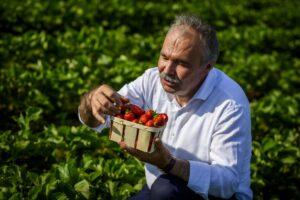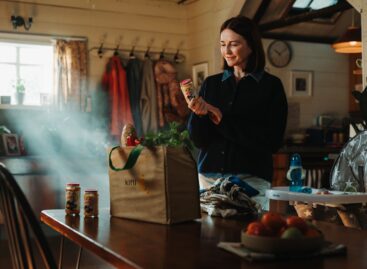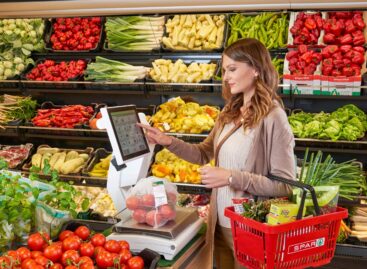Feel free to eat local fruits
The responsible and conscious decision in all areas is to consume seasonal, i.e., domestic fruit harvested at the time of natural ripening, said Minister of Agriculture István Nagy.

(Photo: AM/Csaba Pelsőczy)
The head of the ministry drew attention to the fact that there are more and more people who, instead of foreign imports, wait for the ripening season of Hungarian fruits and choose the products of domestic producers. The feeling of life and consumerism that we want everything, all the time, puts an extraordinary burden on the ecosystem. The need for vegetables and fruits regardless of the season, their transportation from many thousands of kilometers, carries risks in causing climate change. In addition, harvesting when it is not fully ripe reduces the enjoyment value of the fruit and the length of the transport route makes it significantly more expensive. Not to mention the monitoring of the traceability of production and plant protection rules outside the EU and the risk factors that occur in their absence. If we want to be conscious customers, we should eat and buy domestically produced seasonal fruits, because they are a controlled and safe product from the farm to the table.
Pick-your-own deals create an excellent opportunity to eat fresh and safe food
According to the minister, it is worth waiting for domestic fruits to ripen, because then we can eat tastier domestic products instead of imports. As an example, István Nagy mentioned strawberries, which are now in their prime season. He added that very tasty varieties are still dominant for this fruit, and the choice of variety is not determined by the long shelf life, but rather by the flavor. That is why many domestic consumers prefer the much better-tasting Hungarian strawberries over imported products.
The minister emphasized that domestically grown fruit has a smaller ecological footprint
Since it does not travel as much as products imported from abroad, we also put less of a burden on our environment. To this end, the Greyhound Ministry strengthens the short supply chain with a number of measures. He explained that the demand for products produced by local producers has increased over the past ten years. Already in October 2012, we were able to report on the establishment of 117 farmers’ markets, and today this number has almost tripled: at the end of last year, there were already 324 farmers’ markets operating across the country. István Nagy reminded that the Ministry of Agriculture, through the Rural Development Program, announced an investment tender package to help stabilize the production and sales opportunities of small producers. In the context of the call published in October 2020, municipalities operating in rural areas, local ethnic municipalities and non-profit organizations could submit a grant application of up to HUF 100 million for the creation and development of new or existing markets and fairgrounds for the sale of local products. The intensity of the support was between 85 and 95 percent. With the increase in the number of markets, the number of registered small producers also increased in direct proportion: while in 2010 we registered approximately 5,000 small producers, in 2022 we could already count 22,470, he added. István Nagy underlined that it is an important goal for us from the point of view of the national economy, and even from the point of view of national security, that the population primarily searches for and buys domestically produced products. This is especially the case with food. By choosing Hungarian products, we support the livelihood of Hungarian families and the Hungarian economy, added the head of the ministry.
AM
Related news
Two-thirds of Hungarian families already shop this way
🎧 Hallgasd a cikket: Lejátszás Szünet Folytatás Leállítás Nyelv: Auto…
Read more >Adaptation and knowledge have become the key issues of climate change
🎧 Hallgasd a cikket: Lejátszás Szünet Folytatás Leállítás Nyelv: Auto…
Read more >AM: record amount of agricultural subsidies strengthen Hungarian farmers
🎧 Hallgasd a cikket: Lejátszás Szünet Folytatás Leállítás Nyelv: Auto…
Read more >Related news
SPAR is preparing for an Easter rush: it is filling its stores with 570 tons of smoked meat products
🎧 Hallgasd a cikket: Lejátszás Szünet Folytatás Leállítás Nyelv: Auto…
Read more >








